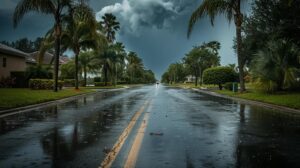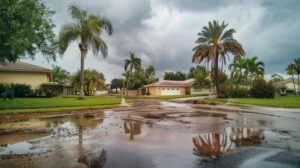When severe weather strikes South Florida and the Treasure Coast, your first concerns are likely power outages, roof damage, or flooding. However, one critical system that often gets overlooked until it’s too late is your water heater. Storm-related water heater failures are more common than many homeowners realize, and understanding the risks can save you from cold showers and costly emergency repairs.
The Hidden Dangers Storms Pose to Your Water Heater
Florida’s frequent thunderstorms, hurricanes, and tropical weather systems create unique challenges for water heating systems throughout St. Lucie County, Martin County, and Palm Beach County. Your water heater, whether gas or electric, faces multiple threats during severe weather events that can lead to immediate failure or long-term damage.
Electrical Surges: The Silent Water Heater Killer
Power surges during storms are among the most common causes of water heater failure. When lightning strikes nearby or when power grids fluctuate during outages, electrical surges can damage your water heater’s heating elements, thermostats, and control systems.
Electric water heaters are particularly vulnerable because they rely entirely on electrical components to function. A single power surge can burn out heating elements that cost hundreds of dollars to replace, or worse, damage the entire unit beyond economical repair. Even gas water heaters aren’t immune—their electronic ignition systems, digital displays, and safety controls can all be compromised by electrical irregularities.
Signs your water heater has suffered electrical damage include no hot water production, tripped circuit breakers that won’t reset, burning smells near the unit, or error codes on digital displays. If you notice any of these symptoms after a storm, it’s crucial to have a professional leak detection and inspection performed immediately.
Flood Damage: When Water Becomes Your Water Heater’s Enemy
Ironically, while water heaters are designed to contain water, they’re extremely vulnerable to flood damage. Even minor flooding that reaches the base of your unit can cause extensive damage to electrical components, insulation, and the tank itself.
Water heaters installed in basements, garages, or utility rooms are at highest risk during flooding events. When floodwater contacts electrical components, it can cause immediate short circuits, corrosion, and contamination of the heating system. Gas water heaters face additional risks if floodwater affects gas lines or the venting system.
Flood-damaged water heaters often require complete replacement rather than repair. The contamination and corrosion caused by floodwater can compromise the safety and efficiency of the entire system. Additionally, insurance companies and local codes may require replacement of flooded units to ensure safety compliance.
Physical Damage and Debris Impact
Strong winds and flying debris during storms can cause direct physical damage to water heaters, especially outdoor units or those in exposed areas. Impact damage can compromise tank integrity, damage venting systems, or affect gas lines and electrical connections.
Even seemingly minor impacts can create hairline cracks in tank walls that may not leak immediately but will fail prematurely. Damaged venting systems on gas units pose serious safety risks, including carbon monoxide exposure and improper combustion.
Age and Storm Vulnerability: A Dangerous Combination
Older water heaters are significantly more susceptible to storm damage than newer units. Water heaters approaching the 8-10 year mark already have aging components that are more likely to fail under the additional stress of power surges, temperature fluctuations, and other storm-related challenges.
If your water heater is over seven years old and has weathered a significant storm, consider having it inspected even if it appears to be functioning normally. Hidden damage from electrical surges or minor flooding may not manifest immediately but can lead to failure weeks or months later.
For homeowners with aging units, a water heater installation or replacement before storm season may be more cost-effective than dealing with emergency repairs during peak demand periods.
Post-Storm Water Heater Safety Checklist
After any significant weather event, homeowners should perform a basic safety check of their water heater system:
Immediate Safety Checks:
- Never approach a water heater standing in water
- Check for gas odors around gas units and evacuate immediately if detected
- Look for visible damage to the tank, pipes, or electrical connections
- Test hot water at multiple faucets to ensure proper heating
Professional Inspection Indicators: Contact a qualified plumber immediately if you notice unusual noises from the unit, discolored or rusty water, lukewarm water when the thermostat is set higher, water pooling around the base of the unit, or any burning smells or electrical odors.
When to Repair vs. Replace After Storm Damage
The decision to repair or replace a storm-damaged water heater depends on several factors including the age of the unit, extent of damage, and cost-effectiveness of repairs.
Repair May Be Viable When:
- The unit is less than five years old
- Damage is limited to easily replaceable components like thermostats or heating elements
- The tank integrity hasn’t been compromised
- Electrical damage is isolated to specific components
Replacement Is Typically Recommended When:
- The unit is over eight years old with significant damage
- Flood water has contacted the unit
- Multiple systems have failed simultaneously
- Repair costs exceed 50% of replacement cost
Modern water heaters also offer improved efficiency and storm resistance compared to older units. Newer models often include better surge protection, improved insulation, and more durable components that can better withstand Florida’s challenging weather conditions.
Protecting Your Water Heater from Future Storm Damage

Prevention is always more cost-effective than emergency repairs. Homeowners can take several steps to protect their water heating systems from storm damage.
Installing a whole-house surge protector provides comprehensive protection for all electrical appliances, including your water heater. For individual unit protection, point-of-use surge protectors designed for water heaters offer targeted defense against electrical surges.
Elevation is crucial for flood-prone areas. Water heaters should be installed on platforms or in elevated locations where possible. In areas with recurring flooding issues, consider tankless water heaters that can be mounted higher on walls.
Regular maintenance also improves storm resilience. Well-maintained units with fresh components are more likely to survive electrical surges and other storm stresses. Annual professional maintenance should include checking electrical connections, testing safety systems, and inspecting for early signs of wear.
The Importance of Professional Assessment
While homeowners can perform basic visual inspections, professional assessment after storm events is crucial for identifying hidden damage that may not be immediately apparent. Licensed plumbers have the tools and expertise to test electrical systems, check gas connections, and evaluate tank integrity.
Professional inspections can identify potential problems before they become emergency failures. This is particularly important in Florida, where the combination of high humidity, salt air, and frequent storms accelerates wear on plumbing systems.
Many insurance policies also require professional documentation of storm damage for claims processing. Having a licensed plumber assess and document any storm-related damage ensures proper insurance coverage and protects your investment.

Emergency Preparedness for Water Heater Failures
Despite best prevention efforts, storm-related water heater failures can still occur. Having an emergency plan helps minimize disruption and safety risks.
Know how to shut off power and water to your water heater in case of emergency. Electric units should be shut off at the circuit breaker, while gas units require closing the gas valve. The water supply valve should also be closed to prevent flooding if the tank develops leaks.
Keep contact information for qualified emergency plumbing services readily available. Storm damage often occurs outside normal business hours, making emergency service capabilities crucial.
Consider temporary alternatives for hot water during repairs or replacement. Portable water heaters, solar shower bags, or arrangements with neighbors can provide temporary solutions while professional repairs are completed.
Regional Considerations for Florida Homeowners
Florida’s unique climate and weather patterns create specific challenges for water heater systems. High humidity accelerates corrosion of metal components, while frequent temperature fluctuations stress heating elements and thermostats.
Coastal areas face additional challenges from salt air, which accelerates corrosion and can compromise electrical connections more quickly than inland locations. Homes in Jupiter, Stuart, and other coastal communities should consider more frequent inspections and maintenance.
Hurricane season preparedness should include water heater considerations. Homeowners in hurricane-prone areas like Port St. Lucie and Fort Pierce should have their systems inspected before hurricane season and consider preemptive replacement of aging units.
Making Informed Decisions About Storm Damage
Storm damage to water heaters can range from minor component failures to complete system replacement needs. Understanding the risks helps homeowners make informed decisions about repairs, replacements, and prevention measures.
Professional assessment is always recommended after significant weather events, even if the water heater appears to be functioning normally. Hidden damage from electrical surges or minor flooding may not manifest immediately but can lead to premature failure and potential safety hazards.
Investing in storm protection measures and regular maintenance provides the best defense against weather-related water heater problems. While the upfront costs may seem significant, they’re typically far less than emergency repairs or premature replacement due to storm damage.
For homeowners throughout South Florida and the Treasure Coast, understanding these risks and taking appropriate preventive measures ensures reliable hot water even after severe weather events. When storm damage does occur, prompt professional assessment and appropriate repairs or replacement help restore comfort and safety to your home as quickly as possible.
Remember that water heater problems often compound during storm recovery periods when demand for plumbing services peaks. Planning ahead with regular maintenance and knowing when to seek professional help ensures you’re not left without hot water when you need it most.








